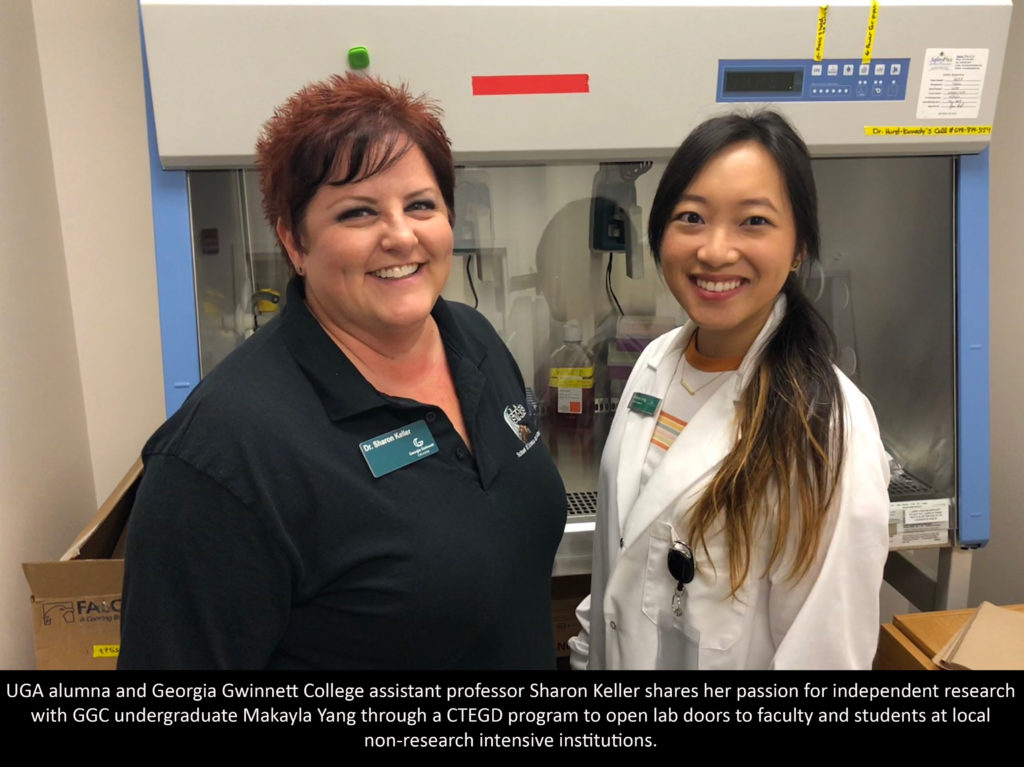CTEGD opens lab doors to undergraduates at area schools

by Donna Huber
When UGA alumna Dr. Sharon Keller accepted the position of Assistant Professor at Georgia Gwinnett College (GGC) she wasn’t ready to say goodbye to the research project she started in graduate school. Since GGC is not a research-intensive institution, Keller approached her Ph.D. mentor Dr. Silvia Moreno, distinguished research professor in the department of cellular biology and member of the Center for Tropical and Emerging Global Diseases (CTEGD) at the University of Georgia, about continuing the project in her free time. It was during this conversation, that they came up with a way of not only keeping Keller in the lab but helping to solve a problem that many undergraduates in the biological sciences face – gaining independent research experience in an NIH-funded laboratory.
“The opportunity to be involved in a collaborative research project was very exciting and an experience that I knew would be attractive to GGC students who might be interested in this type of research,” said Keller.
In 2014, with matching support from Franklin College’s Office of the Dean, the Center for Tropical and Emerging Global Diseases sought to increase diversity in graduate education by offering independent research opportunities to faculty from local non-research intensive institutions. Originally, it was meant to be a 1-month summer sabbatical for these faculty. However, during her conversation with Keller, Moreno saw an opportunity to expand the program.
“Students get very excited when they experience independent research,” said Moreno. “But at some of the smaller schools in the area, they don’t have the opportunity to experience this level of research.”
Many undergraduate teaching labs consist of well-prepared protocols and information on the expected result. The experiments they conduct are supposed to work. That’s not how it happens in real life. In a research lab, a student develops a different skill set from those they learn in a teaching lab. They use critical thinking, problem-solving, and result analysis skills to tackle real-world problems.
“As an instructor, I see the disconnect students can have between a learned concept and the application of that concept,” said Keller.
Keller agreed it was a great idea to include her undergraduates and began the process of selecting students shortly after their initial conversation. Makayla Yang, a student lab assistant in the biology department at GGC, was one of two students selected to accompany Keller 2 – 4 times a week to the laboratory of Dr. Roberto Docampo, the Barbara and Sanford Orkin –GRA Eminent Scholar in Tropical and Emerging Global Diseases.
“Working with trypanosomes at UGA was one of the greatest learning opportunities I have experienced,” said Yang. “It made me see the bigger picture of my work that it was not just an undergraduate research opportunity, but it was a contribution to science and what could be a future health solution.”
It is the hope of the program that by giving faculty and undergraduates from area schools real-life research experience more students will apply to graduate school and have the same competitive edge as students from research-intensive institutions.
For Yang, the experience has her thinking more about pursuing research and a Ph.D. “I was able to discover my true passion for lab bench work,” concluded Yang.
If you are a faculty member at a Georgia non-research intensive institution and are interested in participating in this program, please contact Silvia Moreno (moreno@uga.edu).
Your financial gift will help us expand this program, giving even more area undergraduates hands-on research experience.
[button size=’large’ style=” text=’Give Today’ icon=” icon_color=’#b80d32′ link=’https://ctegd.uga.edu/give/’ target=’_self’ color=” hover_color=” border_color=” hover_border_color=” background_color=” hover_background_color=” font_style=” font_weight=” text_align=’center’ margin=”]
